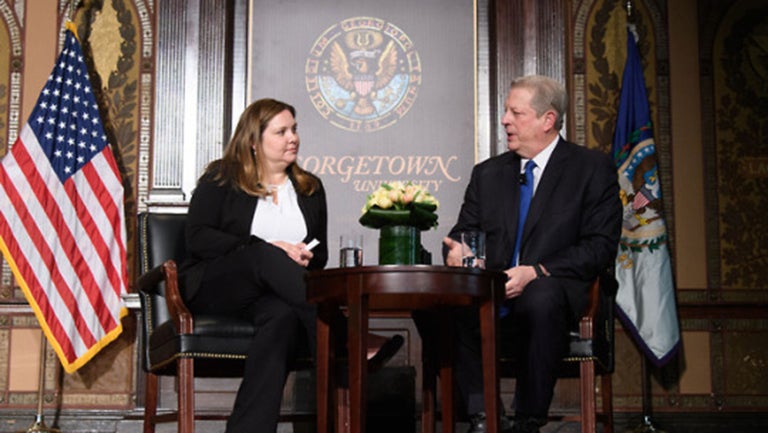Title: Al Gore Offers Audience, Students Hopes and Fears in Fighting Climate Change
Al Gore praises Georgetown’s new Core Pathway on Climate Change during a keynote address on “The Climate Crisis and its Solutions” yesterday in Gaston Hall.

Hilary Rizzo (SFS’20) said it was “amazing” to be able to ask former Vice President Al Gore a question face-to-face yesterday about what individual actions students can take to combat climate change.
Prior to giving a keynote address on “The Climate Crisis and its Solutions” in Gaston Hall, Gore met with faculty and students who are part of Georgetown’s new Core Pathway on Climate Change.
The pathway, which about 100 students began in 2017, allows them to fulfill core and elective requirements in science, theology, history and philosophy through a wide range of interdisciplinary courses addressing climate change.
“Telling us that as students that we have the power to effect change through voting was really meaningful because that’s something we can all do as individuals who are of age to vote here in the U.S.,” said Rizzo, of Bronxville, New York, “and it just gives me a lot of hope for the future.”
‘Especially Impressed’
Gore, a longtime national leader in the fight against climate change, is the author of the New York Times bestselling book An Inconvenient Truth, which became an Oscar-winning documentary in 2006.
The former vice president said during his keynote address that he was “very impressed” with “this creative and impressive core pathway initiative,” and enjoyed hearing presentations from faculty members involved.
“I was especially impressed with the students and questions that they asked,” he added.
Global Sustainability Revolution
During a presentation complete with slides of rising waters, shrinking ice sheets, dry wells, heat waves, extreme storms, decreasing biodiversity and the like, Gore painted a dire picture of what humans have done to the earth thus far and how much worse it could get if no action is taken against climate change.
But he also expressed hope in the fact that many countries worldwide and some U.S. cities and states are embracing renewable energy, that the cost of solar energy is going way down, that companies are embracing electric cars and other positive signs.
“We are now in the beginning stages of a global sustainability revolution,” Gore said. “… it has the magnitude of the industrial revolution with the speed of the digital revolution.”
Gore argued that this revolution is fast being powered by the Internet of Things, machine learning, artificial intelligence, and other developments that give companies “the ability to manage electrons and atoms and molecules with the same precision the IT companies have used in managing system information.”
Political Instability
Now co-founder and chair of The Climate Reality Project, a nonprofit devoted to solving the climate crisis, Gore also said the connection between climate change and political instability has been “under-recognized.”
The “endless line” of refugees from the Middle East and North Africa is connected to climate change, he said, with some scholars reporting that these areas are danger of being completely uninhabitable.
Gore tempered these concerns with occasional humor, such as when Gore showed a slide of the Kentucky Coal Mining Museum with solar panels on its roof or the same kinds of panels on grass huts in India.
Speaking to a largely student audience, he said he was at Georgetown to “recruit” young people.
Be Active
“Whatever walk of life you decide to chart … be active on this issue,” Gore said. “It is the most important challenge humankind has ever faced … it affects everything, everything we do, everything we are.”
“That is one of the reasons why this core pathway initiative that Georgetown is launching is so well-framed,” he added. “Because when you tackle a crisis that involves almost everything it’s only appropriate to draw from the sources of all the disciplines that give us the knowledge by which we try to make good decisions.”
After his talk, Gore answered a number of students’ questions read by Joanna Lewis, an associate professor in Georgetown’s Science, Technology and International Affairs Program at the School of Foreign Service. Lewis once helped Gore in advance of the Kyoto Protocol to the United Nations Framework Convention of Climate Change.
“Start early,” he concluded, “be a part of helping the United States and the world successfully solve the climate crisis and chart a new course for humanity toward a cleaner, safer, more prosperous, more equal more just world. We can do it.”